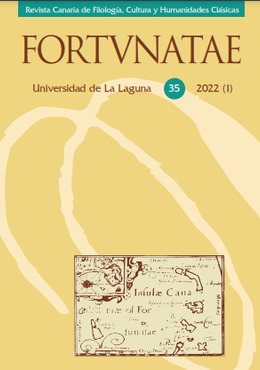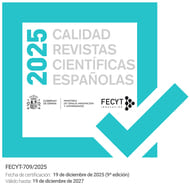Los celos amorosos (ζηλοτυπία) en la Grecia imperial
Resumen
Este estudio sobre el origen de los celos amorosos en la Grecia imperial tiene como principal objetivo demostrar que el término ζηλοτυπία denotaba el recelo por la pérdida del afecto y la atención del ser amado, observable a partir de los testimonios escritos, procedentes de fuentes diversas, tales como la novela, la filosofía moral, la oniromancia o los papiros mágicos.
Citas
BABBITT, F. C. (ed.) (1962): Plutarch’s Moralia. Volume II, Loeb Classical Library 222, Harvard University Press, Cambridge, MA.
BYWATER, I. (ed.) (2010): Aristotelis Ethica Nicomachea, Cambridge Library Collection-Classics, Cambridge University Press, Cambridge.
FUHRMANN, M. (ed.) (2010): Ars rhetorica: qvae vvlgo fertvr Aristotelis ad Alexandrvm, Bibliotheca scriptorum Graecorum et Romanorum Teubneriana, De Gruyter, München.
GARNAUD, J. P. (ed.) (1991): Achille Tatius. Le Roman de Leucippé et Clitophon, Les Belles Lettres, Paris.
HABRICH, E. (ed.) (1960): Iamblichi Babyloniacorum reliquiae, Teubner, Leipzig.
HUDSON-WILLIAMS, H. L. (ed.) (1965): ‘Longinus’ On Sublimity, Clarendon Press, Oxford.
LÓPEZ JIMENO, A. (ed.) (2001): Textos griegos de maleficio, Akal, Madrid.
PACK, R. A. (ed.) (1963): Artemidori Daldiani Onirocriticon libri V. Bibliotheca scriptorum Graecorum et Romanorum Teubneriana, De Gruyter, München.
RATTENBURY, R. M. y T. W. LUMB (eds.) (2003a): Héliodore. Les Éthiopiques. Théagène et Chariclée. Tome II: Livres IV-VII, Les Belles Lettres, Paris.
RATTENBURY, R. M. y T. W. LUMB (eds.) (2003b): Héliodore. Les Éthiopiques. Théagène et Chariclée. Tome III: Livres VIII-X, Les Belles Lettres, Paris.
RATTENBURY, R. M. y T. W. LUMB (eds.) (2011): Héliodore. Les Éthiopiques. Théagène et Chariclée. Tome I: Livres I-III, Les Belles Lettres, Paris.
ROSS, W. D. (ed.) (2020): Oxford Classical Texts: Aristotelis: Ars Rhetorica, Oxford University Press, Oxford. RUSSELL, D. A. (ed.) (2002): Quintilian. The Orator’s Education. Volume III: Books 6-8, Loeb Classical Library 126, Harvard University Press, Cambridge, MA.
SANZ MORALES, M. (ed.) (2020): Chariton of Aphrodisias ‘Callirhoe’: a critical edition, Antike Texte, Band 2, Universitätsverlag Winter, Heidelberg.
ANDERSON, G. (1984): Ancient Fiction. The novel in the Graeco-Roman world, Barnes and Noble, New Jersey.
BOURKE, J. (2015): Fear: A Cultural History, Virago, London.
BRETHES, R. (2009): «Rien de trop: la recherche d’un juste milieu chez Aristote, Ménandre et Chariton», en B. POUDERON y C. BOST POUDERON (eds.), Passions, vertus et vices dans l’ancient roman. Actes du colloque de Tours, Maison de l’Orient méditerranéen (Collection de la Maison de l’Orient méditerranéen ancient, 42. Série littéraire et philosophique, 14), Lyon, pp. 71-83.
CASTON, R. (2012): The Elegiac Passion: Jealousy in Roman Love Elegy, Oxford University Press, New York.
COURAUD-LALANNE, S. (1998) : «Récit d’un τελος ἐρωτικον: (sic) réflexions sur le statut des jeunes dans le roman de Chariton d’Aphrodisias», Revue des Études Grecques 111 (2) : 518-550.
DA RIVA, R. (2020): «Celebraciones salvajes y rituales sexuales en la antigua Mesopotamia. Las Líricas amorosas divinas, los celos y el deseo femenino en la sociedad patriarcal babilónica del milenio I a.C.», en M. A. FARGAS PEÑARROCHA (coord.), Alternativas. Mujeres, género e historia, Universitat de Barcelona, Barcelona, pp. 29-46.
FOUCAULT, M. (2014): Historia de la sexualidad 3. La inquietud de sí, Siglo XXI, México.
FUSILLO, M. (1990): «Le conflit des émotions: un topos du roman grec érotique», Museum helveticum 47: 201-221.
GRIMAL, P. (1981): Diccionario de mitología griega y romana, Paidós, Barcelona.
HELMS, J. (1966): Character Portrayal in the Romance of Chariton, Mouton, The Hague/Paris.
JOUANNO, C. (2001): «Chariton et le langage du corps», en A. BILLAULT (ed.), OPORA. La belle saison de l’hellénisme. Études de littérature antique offertes au Recteur Jacques Bompaire, Presses de l’Université de Paris-Sorbonne, Paris, pp. 73-84.
KASTER, R. A. (2005):Emotion, Restraint, and Community in Ancient Rome, Oxford University Press, Oxford.
KONSTAN, D. (1994), Sexual Symmetry. Love in the Ancient Novel and Related Genres, Princeton University Press, Princeton-NJ.
KONSTAN, D. (2004): «Las emociones en la antigüedad griega», Pensamiento y cultura 7: 47-54.
KONSTAN, D. (2005): «La invención de los celos», ARETÉ. Revista de Filosofía 1: 45-58.
KONSTAN, D. (2006) : «Y a-t-il une histoire des émotions?», ASDIWAL. Revue genevoise d’anthropologie et d’histoire des religions 1: 23-35.
KONSTAN, D. y RUTTER, N. K. (eds.) (2003): Envy, Spite and Jealousy: The Rivalrous Emotions in Ancient Greece, Edinburg University Press, Edinburg.
LUTZ, C. A. (1988): Unnatural Emotions: Everyday Sentiments on a Micronesian Atoll and their Challenge to Western Theory, University of Chicago Press, Chicago.
NUSSBAUM, M. (1996): «Aristotle on Emotions and Rational Persuasion», en A. OKSENBERG RORTY (ed.), Aristotle’s Rhetoric, University of California Press, Berkeley/Los Angeles, pp. 303-323.
NÚÑEZ PAZ, M. I. (1988): Consentimiento matrimonial y divorcio en Roma, Ediciones Universidad Salamanca, Salamanca.
PAGLIALUNGA, E. (2000): «Amor y celos en los personajes masculinos de Caritón de Afrodisias», Florentia Iliberritana 11: 181-194.
PLAMPER, J. (2014): «Historia de las emociones: caminos y retos», Cuadernos de Historia Contemporánea 36: 17-29.
ROJAS ÁLVAREZ, L. (2019) : «El amor en la novela griega», Nova Tellus 37/2: 27-47.
ROSENWEIN, B. H. (2002): «Worrying about Emotions in History?», The American Historical Review 107-(3): 821-845.
TOV-RUACH, L. (1980): «Jealousy, Attention, and Loss», en A. OKSENBERG RORTY (ed.), Explaining Emotions, University of California Press, Berkeley, pp. 465-488.
TRUEBA ATIENZA, C. (2009): «La teoría aristotélica de las emociones», Signos Filosóficos XI (22): 147-170.
WINKLER., J. J. (1994): Las coacciones del deseo, Manantial, Buenos Aires. λοΓΕΙοΝ: http://logeion.uchicago.edu/ (26/11/2021).
PROYECTO DICCIONARIO GRIEGO-ESPAÑOL, Instituto de Lengua y Culturas del Mediterráneo y Oriente Próximo, Centro de Ciencias Humanas y Sociales CSIC, Madrid, consultable en: http://dge.cchs.csic.es/ (01/04/2019).
REAL ACADEMIA ESPAÑOLA (2021), Diccionario de la lengua española. Edición del Tricentenario. Consultado en https://dle.rae.es/ (25/08/2021).
Los autores conservan los derechos de autor y garantizan a la revista el derecho de ser la primera publicación del trabajo al igual que licenciarlo bajo una Creative Commons Attribution License que permite a otros compartir el trabajo con un reconocimiento de la autoría del trabajo y la publicación inicial en esta revista.
Los autores pueden establecer por separado acuerdos adicionales para la distribución no exclusiva de la versión de la obra publicada en la revista (por ejemplo, situarlo en un repositorio institucional o publicarlo en un libro), con un reconocimiento de su publicación inicial en esta revista.






